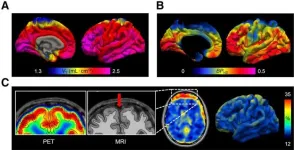(Press-News.org) Most humans have long-lived infections in various tissues—including in the nervous system—that typically do not result in disease. The microbes associated with these infections enter a latent stage during which they quietly hide in cells, playing the long game to evade capture and ensure their own survival. But a lack of natural models to study these quiescent stages has led to gaps in scientists’ understanding of how latency contributes to pathogen persistence and whether these stages can be targeted by the immune system.
Now, a team led by University of Pennsylvania School of Veterinary Medicine researchers shows that the immune system indeed recognizes the latent stage of the parasite Toxoplasma gondii, which causes toxoplasmosis—challenging some common assumptions about how the immune system deals with infections in the brain. Penn Vet professor Christopher A. Hunter, the paper’s senior author, says this knowledge supports the idea that Toxoplasma gondii cysts can be targeted and perhaps even cleared, and the findings have implications for other infections and potential future therapies. The paper also demonstrates how cysts promote the mutual survival of the parasite and host.
In its latent stage, Toxoplasma gondii forms long-lived cysts in neurons in the brain, which helps the parasite evade the host’s immune response. However, in this study, the researchers found that certain T cells can target neurons containing cysts, thereby promoting parasite control. But there’s a tradeoff: They also found that when cysts are not formed, there is an even higher parasite burden and increased damage to the brain. The study is published in Nature Microbiology.
“There’s this balance of the pathogen needing to take hold in the host but not expand so much that it’s detrimental to the host, because if the host dies, the pathogen may not survive,” says author Lindsey A. Shallberg, who at the time of the research was a doctoral student in Hunter's lab.
Toxoplasma gondii causes toxoplasmosis, an infection that is asymptomatic for most healthy people but poses a greater risk for those who are immunocompromised or pregnant. It is caused by eating contaminated, poorly cooked meat and by exposure to infected cat feces, as felines are the only animal in which the parasite can sexually reproduce.
Co-author Julia N. Eberhard, an immunology doctoral student, points to two findings that run counter to preexisting literature and common notions among immunologists. She says scientists long thought that Toxoplasma gondii cysts could hide out in neurons to prevent immune recognition, but this study showed that “neurons aren’t this complete refuge for pathogens.”
Eberhard says another commonly held belief was that the parasite needs to form cysts to be able to persist, but in looking at a parasite strain that couldn’t convert to the cyst stage, the researchers found that the immune system did not clear the parasite. They could still identify parasites in mice six months later, which Eberhard found very surprising.
Mathematical modeling independently confirmed experimental findings and indicated that immune pressure on the latent stage of Toxoplasma gondii could explain the observed rise and fall in cyst numbers. This was done by Aaron Winn, a doctoral student in the Department of Physics and Astronomy in the School of Arts & Sciences.
Shallberg says this paper came about because co-author Sebastian Lourido, an associate professor of biology at MIT, had identified the key molecular mechanism that allows the parasite to become latent and wanted to know what would happen if the parasite could not form cysts. In addition, co-author Anita Koshy, a neurologist and scientist at the University of Arizona, had evidence that some neurons could rid themselves of this infection.
While Toxoplasma gondii is a relevant microorganism to study in and of itself, it is also useful in furthering scientists’ understanding of nervous system infections with latent stages in humans that don’t have mouse models, such as cytomegalovirus. “What makes it special is the fact that it’s a tractable model that we can use in the lab and then apply what we’ve learned to other infections,” Shallberg says.
Looking ahead, Hunter says that his laboratory continues to investigate whether T cells directly recognize the neurons and to study the T cell response in more detail.
Christopher A. Hunter is the Mindy Halikman Heyer Distinguished Professor of Pathobiology at the University of Pennsylvania School of Veterinary Medicine.
Lindsey A. Shallberg was an immunology doctoral student in the University of Pennsylvania Perelman School of Medicine at the time of this research.
Aaron Winn is a sixth-year doctoral student in the Department of Physics and Astronomy in the School of Arts & Sciences.
Julia N. Eberhard is a fifth-year immunology doctoral student at Penn Medicine.
Other co-authors are Penn Vet’s Daniel L. Aldridge, Molly Bunkofske, David A. Christian, Maxime Jacquet, and Elinor Wilis; Penn Arts & Science’s Eleni Katifori; Massachusetts Institute of Technology and Whitehead Institute for Biomedical Research’s Christopher J. Giuliano and Sebastian Lourido; University of Arizona’s Anita A. Koshy, Sambamurthy Chandrasekaran, and Emily F. Merritt; and the Royal Ottawa Mental Health Center’s Florence Dzierszinski.
This research was supported by the National Institutes of Health (grants AI157247, AI160664, AI161962, CA009140, AI158501, and AI157247); the Commonwealth of Pennsylvania; and institutional funding from the College of Medicine and BIO5 Institute of the University of Arizona.
END
Understanding the immune response to a persistent pathogen
Penn Vet researchers show that the immune system can recognize and control the latent stage of the parasite Toxoplasma gondii, a finding that can inform the study of latency in other infections of the nervous system.
2025-03-28
ELSE PRESS RELEASES FROM THIS DATE:
GSA conducting April 1 congressional briefing on impact of obesity as we age
2025-03-28
The Gerontological Society of America (GSA) invites you to a congressional briefing:
Title: The Impact of Obesity and Opportunity for CMS to Address
When: Tuesday, April 1, from 12 to 1 p.m. ET
Where: Virtual
Click to RSVP
GSA is a professional membership organization committed to promoting the best available interdisciplinary aging research to advance innovations in practice and policy. This is especially key to managing the chronic condition of obesity in health care.
Older people with obesity and overweight require access to proven treatment options and care to improve overall health and reduce other related health care costs. ...
Professor receives pilot funding to conduct study to increase forest farming in Appalachia
2025-03-28
Appalachia is globally recognized as a key supplier of non-timber forest products (NTFPs) with growing demand for its resources. Nearly half of the woodland medicinal species in the global nutraceutical market come from the region, contributing to a multibillion-dollar industry.
Species such as ginseng, slippery elm, and black cohosh are prominent understory sources of medicinal material. Appalachian edible products are also gaining popularity beyond the region. Ramps, a wild Appalachian plant, can sell for more than $20 per pound in places such as New York City.
Spanning 205,000 square miles, Appalachia is home to over ...
New PET radiotracer provides first look at inflammation biomarker in the human brain
2025-03-28
Reston, VA (March 28, 2025)—A novel PET imaging approach can effectively quantify a key enzyme associated with brain inflammation, according to research published in the March issue of The Journal of Nuclear Medicine. The first-in-human study, which imaged the COX-2 enzyme, offers a never-before-seen view of inflammation in the brain, opening the door for COX-2 PET imaging to be used in clinical and research settings for various brain disorders.
COX-2 is an enzyme in the brain that can be markedly upregulated by inflammatory stimuli and neuroexcitation. Researchers say that the density of COX-2 in the brain may be a biomarker and effect of inflammation, ...
Genes may influence our enjoyment of music
2025-03-28
Music is central to human emotion and culture. Does our ability to enjoy music have a biological basis? A genetic twin study, published in Nature Communications, shows that music enjoyment is partly heritable. An international team led by scientists from the Max Planck Institute for Psycholinguistics in Nijmegen, the Netherlands, uncovered genetic factors that influence the degree of music enjoyment, which were partly distinct from genes influencing general enjoyment of rewarding experiences or musical ability.
Music plays an important role in human emotion, social bonding, and cultural expression. As Darwin already noted, music "must ...
Global patterns in seed plant distribution over millions of years
2025-03-28
Why do some plants thrive in specific regions but not in others? A study led by researchers at the University of Göttingen explores the factors shaping plant distributions and how these patterns have changed over millions of years. Analyzing nearly 270,000 seed plant species worldwide, the research highlights the roles of environmental conditions and dispersal barriers in influencing global plant diversity. The results were published in Nature Ecology & Evolution.
Using advanced methods that integrate plant distributions with phylogenetic information – meaning data about the evolutionary relationships among plant species – researchers ...
Fatty acids promote immune suppression and therapy resistance in triple negative breast cancer
2025-03-28
HOUSTON – (March 28, 2025) – A new study published in the journal Immunity reveals a mechanism that allows triple negative breast cancer (TNBC) to develop resistance to therapy. Researchers at Baylor College of Medicine showed that lipid accumulation in tumor cells and nearby immune cells promotes immune suppression, but disrupting lipid formulation reverses treatment resistance and the immunosuppressive microenvironment.
Standard-of-care treatment for TNBC includes chemotherapy and immunotherapy. However, some initially responsive tumors still develop recurrences. Researchers studied mouse models and found that TNBC cells that survived treatment accumulated ...
Intermittent fasting increases sex drive in male mice: an approach for low libido in humans?
2025-03-28
Long-term fasting in 24-hour cycles increases the sex drive of male mice by lowering the concentration of the neurotransmitter serotonin in the brain. This effect is linked to a diet-induced deficiency of the precursor substance tryptophan – an amino acid that must be obtained through food. Researchers from DZNE report on this in the journal Cell Metabolism, together with a Chinese team from Qingdao University and the University of Health and Rehabilitation Sciences. They suggest that similar mechanisms may exist in humans and view fasting as a potential approach for treating unwanted loss of sexual desire.
Fasting ...
Scientists create protein ‘seeds’ that trigger key pathological features of ALS and frontotemporal dementia
2025-03-28
28 March 2024, Leuven, Belgium — Accumulation of a protein called TDP-43 is a key feature of ALS and frontotemporal dementia. In a newly published study, researchers report ‘seeding’ this accumulation through fragments of the culprit protein created in the lab. The findings provide further evidence for a prion-like paradigm wherein protein aggregation occurs in a templated fashion. This breakthrough provides the research field with a powerful way to model and study the mechanisms driving neurodegeneration.
TAR DNA-binding ...
Discrimination-related depression, anxiety pronounced among multiracial, White, Asian populations
2025-03-28
EMBARGOED UNTIL 11 a.m. EST on Friday, March 28, 2025
Contact:
Jillian McKoy, jpmckoy@bu.edu
Michael Saunders, msaunder@bu.edu
##
Discrimination-related Depression, Anxiety Pronounced Among Multiracial, White, Asian Populations
A new study found that more than half of US adults encounter some form of discrimination, and that this mistreatment may fuel higher chances of depression and/or anxiety among specific racial and ethnic groups due to cultural, social, and systemic factors.
A ...
New approach makes one type of clean fuel production 66% more efficient
2025-03-28
COLUMBUS, Ohio – Researchers have uncovered a more efficient way to turn carbon dioxide into methanol, a type of alcohol that can serve as a cleaner alternative fuel.
In the lab, synthesizing methanol can be extremely difficult, due to the extremely complex reaction pathway needed to select for it. Previous attempts by the same team to manufacture this valuable liquid fuel from carbon dioxide have used a combination of cobalt phthalocyanine (CoPc) molecules and electricity, but this method is inefficient as only about 30% of the carbon dioxide is converted to methanol.
To ...
LAST 30 PRESS RELEASES:
Spiritual practices strongly associated with reduced risk for hazardous alcohol and drug use
Novel vaccine protects against C. diff disease and recurrence
An “electrical” circadian clock balances growth between shoots and roots
Largest study of rare skin cancer in Mexican patients shows its more complex than previously thought
Colonists dredged away Sydney’s natural oyster reefs. Now science knows how best to restore them.
Joint and independent associations of gestational diabetes and depression with childhood obesity
Spirituality and harmful or hazardous alcohol and other drug use
New plastic material could solve energy storage challenge, researchers report
Mapping protein production in brain cells yields new insights for brain disease
Exposing a hidden anchor for HIV replication
Can Europe be climate-neutral by 2050? New monitor tracks the pace of the energy transition
Major heart attack study reveals ‘survival paradox’: Frail men at higher risk of death than women despite better treatment
Medicare patients get different stroke care depending on plan, analysis reveals
Polyploidy-induced senescence may drive aging, tissue repair, and cancer risk
Study shows that treating patients with lifestyle medicine may help reduce clinician burnout
Experimental and numerical framework for acoustic streaming prediction in mid-air phased arrays
Ancestral motif enables broad DNA binding by NIN, a master regulator of rhizobial symbiosis
Macrophage immune cells need constant reminders to retain memories of prior infections
Ultra-endurance running may accelerate aging and breakdown of red blood cells
Ancient mind-body practice proven to lower blood pressure in clinical trial
SwRI to create advanced Product Lifecycle Management system for the Air Force
Natural selection operates on multiple levels, comprehensive review of scientific studies shows
Developing a national research program on liquid metals for fusion
AI-powered ECG could help guide lifelong heart monitoring for patients with repaired tetralogy of fallot
Global shark bites return to average in 2025, with a smaller proportion in the United States
Millions are unaware of heart risks that don’t start in the heart
What freezing plants in blocks of ice can tell us about the future of Svalbard’s plant communities
A new vascularized tissueoid-on-a-chip model for liver regeneration and transplant rejection
Augmented reality menus may help restaurants attract more customers, improve brand perceptions
Power grids to epidemics: study shows small patterns trigger systemic failures
[Press-News.org] Understanding the immune response to a persistent pathogenPenn Vet researchers show that the immune system can recognize and control the latent stage of the parasite Toxoplasma gondii, a finding that can inform the study of latency in other infections of the nervous system.


